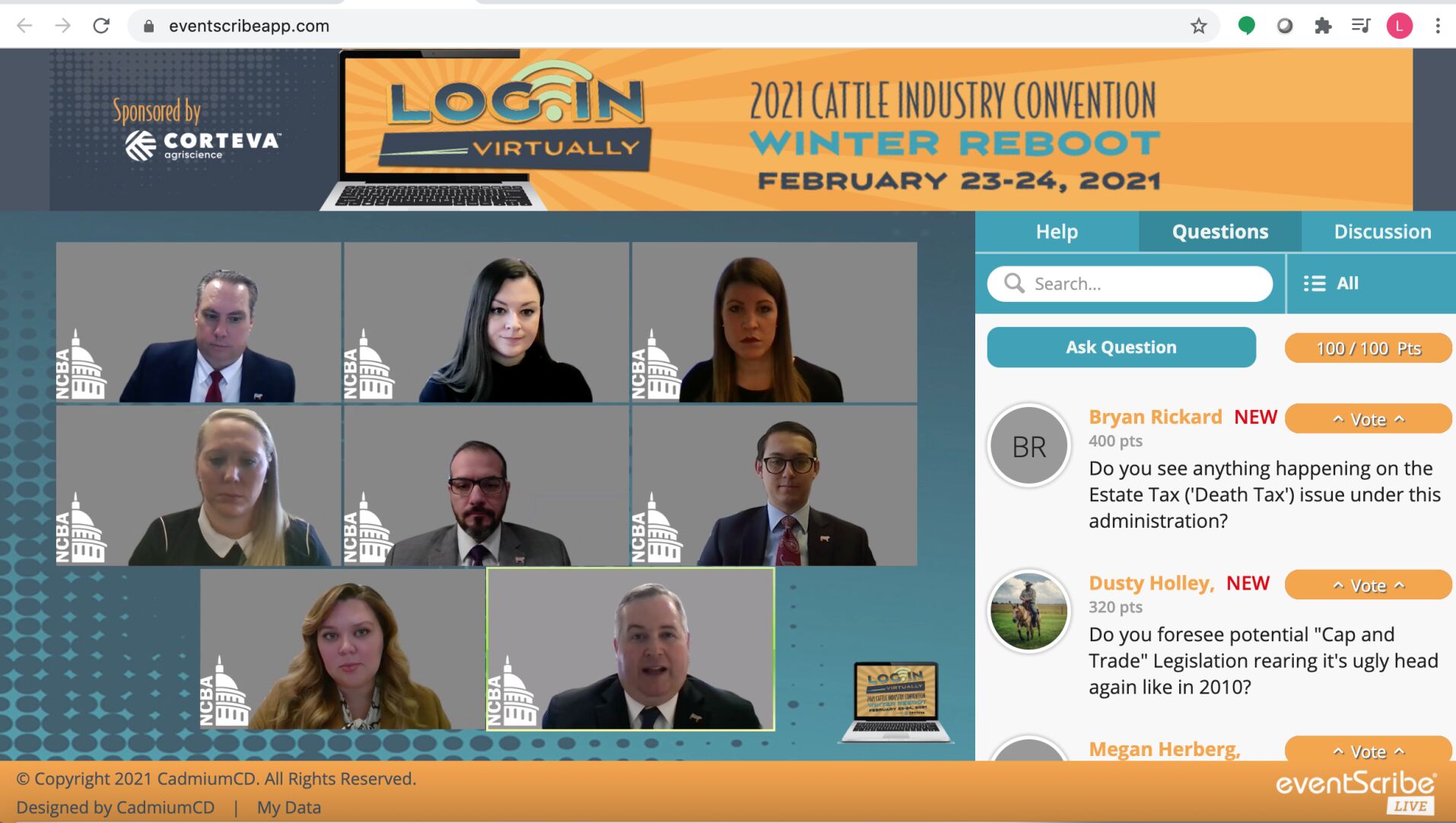“I know you won’t read this in the mainstream media, but I believe that the moderate wing of the Democratic Party has found its voice and is in control”—at least, on issues of importance to cattle producers.
These words were spoken by Ethan Lane, vice president of government affairs at the National Cattlemen’s Beef Association, on the opening day of the NCBA’s Winter Reboot, its first-ever virtual meeting, which took place Feb. 23 to 24.
Lane admits that not all of his own members accept this claim. “I’ve gotten some argument about this from some of our members,” he acknowledged. But he maintains the doors are much more open for dialogue, at least, under Joe Biden than they were under the Obama administration. “Under Obama, we’d put our names down to get press releases, and White House staffers would delete them. They wouldn’t even send us press releases,” said Lane.
By contrast with the earlier administration, Lane highlighted what he said were productive conversations with Joe Biden’s nominee to head the Environmental Protection Agency, Michael Regan. Regan is likely to be confirmed by the Senate, having been approved Feb. 9 by the Senate Environment and Public Works Committee by a 14-6 vote that included four Republicans.
Colin Woodall, CEO of the NCBA, said a document had circulated among members of the Biden transition team that mentioned cattle producers as part of the potential solution to climate and carbon sequestration issues—something he said was a positive surprise. “The fact is that there are no achievable conservation objectives without the participation of cattle producers, and this is something we’re hearing from the administration,” he said. “We can’t be afraid of that conversation.
Lane pointed out the NCBA was the only ag trade advocacy group that never closed during the COVID-19 outbreak, remaining working and maintaining relationships in Congress. “You don’t get things done in Washington unless you’re there,” Woodall pointed out. “We’re in the friend-making business.
Many green activists target “agribusiness” and cattle-raising in particular as detrimental to the environment, often repeating inflated or incorrect figures about their contributions to various climate issue. Bill Gates recently caused a social media storm by saying in a televised interview that to fight climate change, all residents of “rich countries” should probably eat 100% fake meat. Gates has heavily invested in farmland and has direct interests in companies that grow and process the ingredients in fake meat.
Woodall said vegetarian numbers—about 3% percent of the population—haven’t budged in 30 years. He said the reason they have to talk about cattle-raising’s environmental and climate impacts is because they have lost the argument on animal welfare.
Grazing is good
Danielle Beck, an NCBA staffer jokingly known by her colleagues as the “fake meat queen,” said cattle producers have a great story to tell about the many conservation and regenerative practices they already engage in. “Grazing is good,” she said, including on federal lands. The NCBA is fighting to have such existing carbon-sequestering practices recognized—and if possible, compensated or credited—in any laws or regulations promoting carbon sequestration in agriculture, including “carbon bank” schemes that pay producers for practices that sequester carbon in soil.
Woodall and Lane highlighted the NCBA’s successful work on getting cattle producers included in both COVID relief measures, the Paycheck Protection Program and the Coronavirus Food Assistance Program, which is currently paused while under review by the Biden administration. Cattle producers received the single biggest chunk of ag-related COVID aid, about $7 billion, with a $1.4 billion “top-up” still in the pipeline.
“We know there will be challenges in working with this administration, and we’re ready for them, but the atmosphere is ‘night and day’ different from what it was under Obama,” Woodall said.
Despite a flurry of executive orders issued by Biden in his first weeks in office, Land and Woodall stressed that it takes time to reverse regulations and policies in Washington. “Most of our big wins under the Trump administration came in the last two years,” said Lane.
Water fight will go to Supreme Court
On one issue of top concern to cattle producers and all ag interests, the Navigable Waters Protection Rule, NCBA staffer Scott Yager, chief environmental counsel, said it would likely go to the Supreme Court. Finalized in April 2020, this was the Trump administration’s replacement of the highly contentious “waters of the United States” rule that was first proposed by the Obama administration and immediately tied up in litigation.
Yager pointed out that it took Trump officials years to get WOTUS repealed and replaced, and it will take at least that long to replace with anything palatable to the green wing of the Biden administration. They can’t go back to the 2015 WOTUS rule, because several courts have declared large parts of it illegal. So Biden’s team will have to come up with something that can withstand review in today’s Supreme Court, which has a very different makeup from the court that decided Rapanos v. United States, the 2006 case that helped inform the first version of WOTUS.
David Murray can be reached at [email protected].




